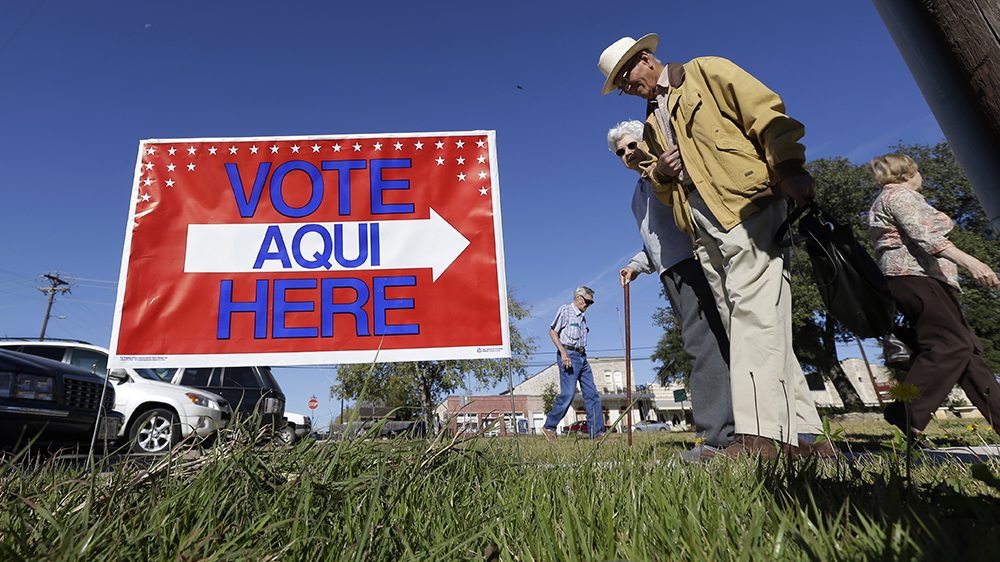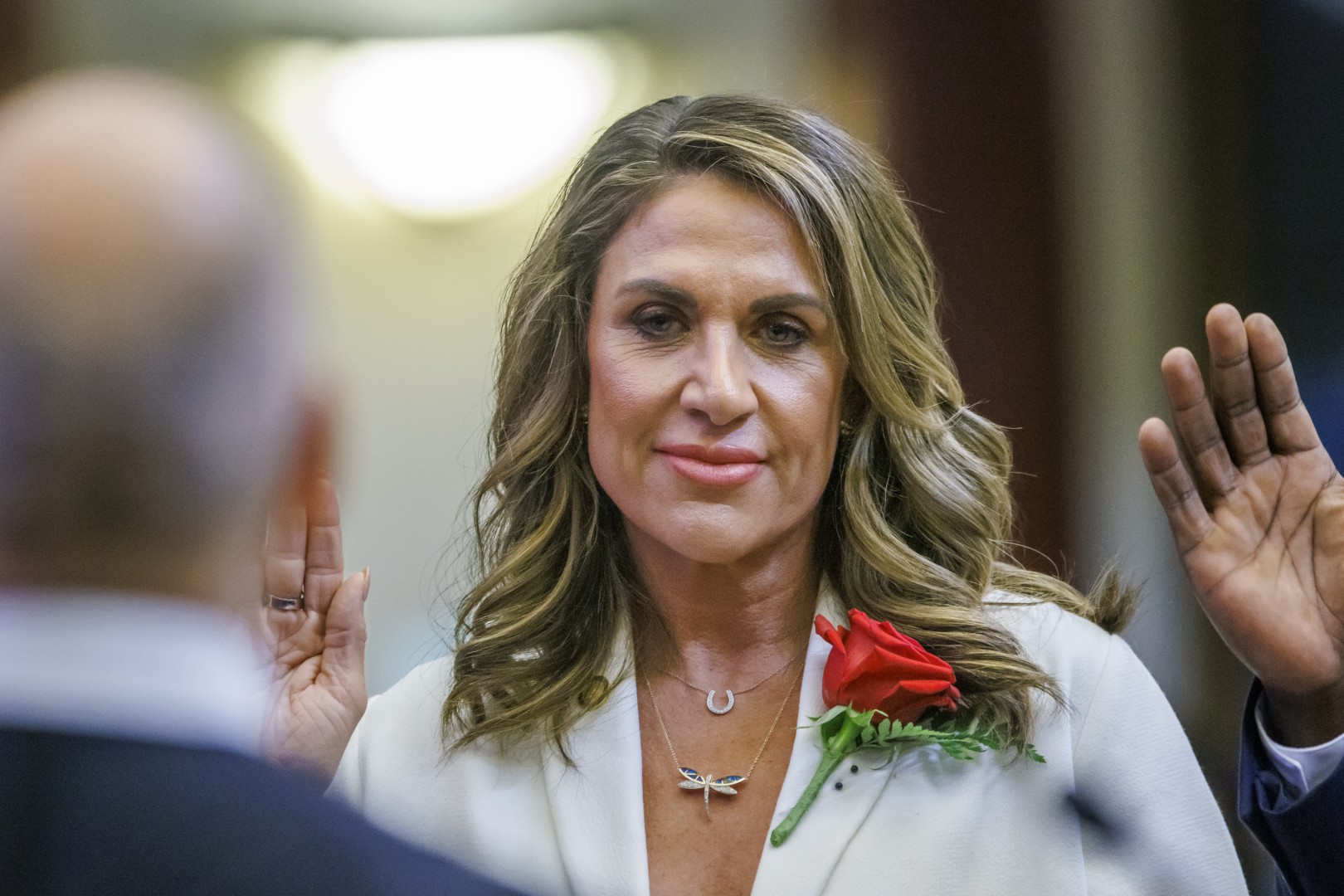A trio of spring elections provided early warning signs to Republicans and President Donald Trump on Tuesday, as Democrats rallied against his efforts to slash the federal government and the outsize role being played by billionaire Elon Musk in the early days of his new administration.
In the marquee race for a Wisconsin Supreme Court seat, the conservative judge endorsed by Trump and backed by Musk and his groups to the tune of $21 million lost by 10 percentage points in a state Trump won in November. And while Florida Republicans held two of the most pro-Trump House districts in the country, both candidates underperformed Trump’s November margins.
The elections — the first major contests since Trump’s return to power — were seen as an early measure of voter sentiment as Trump works with unprecedented speed to dramatically upend the federal government, clashing with the courts and seeking revenge as he tests the bounds of presidential power.
The party that loses the presidency in November typically picks up seats in the next midterm elections, and Tuesday’s results provided hope for Democrats — who have faced a barrage of internal and external criticism about their response to Trump — that they can follow that trend.
Charlie Kirk, the conservative activist and podcaster whose group worked alongside Musk to boost conservative Brad Schimel in Wisconsin, argued Tuesday’s Supreme Court loss underscored a fundamental challenge for Republicans, particularly in races where Trump is not on the ballot.
“We did a lot in Wisconsin, but we fell short. We must realize and appreciate that we are the LOW PROP party now,” he said in an X post, referring to low-propensity voters who don’t regularly cast ballots. “The party has been remade. Special elections and off-cycle elections will continue to be a problem without a change of strategy.”
Trump won Wisconsin in November by 0.8 percentage points, or fewer than 30,000 votes. In the first major test since he took office in January, the perennial battleground state shifted significantly to the left, and not only in typical Democratic strongholds.
Sauk County, northwest of the state capital of Madison, is a state bellwether. Trump won it in November by 626 votes. Sauk shifted 16 percentage points in the direction of Judge Susan Crawford, the liberal backed by national Democrats and billionaire donors like George Soros.
Besides strong turnout in Democratic-heavy areas, Crawford did measurably better in the suburban Milwaukee counties that Republicans rely on to run up their margins statewide.
Crawford won Kenosha and Racine counties, both of which went for Trump over Democratic nominee Kamala Harris. She won by about 10 percentage points there.
Turnout was just under 50%, a full 10 percentage points higher than the previous record high for a Wisconsin Supreme Court election, set just two years ago.
In interviews with dozens of voters across the state, including more than 20 in Waunakee, a politically mixed town north of Madison, many Democrats suggested without prompting that their vote was as much if not more of a repudiation of Trump’s first months in office than a decision on the direction of the state high court.
“This is our chance to say no,” said Linda Grassl, a retired OB-GYN registered nurse, after voting at the Waunakee Public Library corridor Tuesday.
“We have to fight, and this is where the fight is today,” agreed Theresa Peer, a 49-year-old business-owner born and raised in Milwaukee, who called the election a “fight for our democracy.” She said she hoped a Crawford win would serve as a “symbol of opposition” to the Trump administration, particularly on the issues of women’s reproductive rights and slashed education spending.
Others disliked the richest man in the world playing such a prominent role.
“I don’t like Elon Musk spending money for an election he should have no involvement in,” said Antonio Gray, a 38-year-old Milwaukee security guard. “They should let the voters vote for who they want to vote for instead of inserting themselves like they have.”
Senate Democratic Leader Chuck Schumer, in a floor speech Wednesday, called the results “a political warning shot from the American people” and a sign that “Democrats’ message is resonating.”
“Just 70 days into Trump 2.0, Americans are tired of the chaos. They are tired of Elon Musk attacking Social Security, Medicaid, Medicare,” he said.
Former Wisconsin Gov. Scott Walker said that part of the challenge for Republicans had been “trying to connect the dots” to turn the state Supreme Court race into one about Trump — a difficult task in a state judicial race. He wondered if the outcome would have been different had Trump paid a visit to the state instead of hosting a telephone town hall.
“If you’re somebody who showed up for Trump because you feel forgotten, you don’t typically show up to vote in” these kinds of elections, he said, imagining voters asking themselves: “What does this have to do with Trump?”
Still, Walker cautioned against reading the tea leaves too closely.
“I’d be a little bit careful about reading too much into what happens nationally,” he said.
Trump had better luck in Florida, where Republican Randy Fine won his special election in the 6th District to replace Mike Waltz, who stepped down to serve as Trump’s national security adviser. But Fine beat his Democratic challenger, Josh Weil, by 14 percentage points less than five months after Waltz won the district by 33.
“This is the functional equivalent of Republicans running a competitive race in the district that is represented by Representative Alexandria Ocasio-Cortez,” said House Democratic Leader Hakeem Jeffries beforehand, invoking a liberal favorite whom Trump often denigrates. “Kamala Harris won that district by 30 points. Do you think a Republican would even be competitive in that district in New York, currently held by Alex? Of course, not.”
Jimmy Patronis, the state’s chief financial officer, fended off a challenge from Democrat Gay Valimont to win the northwest Florida seat vacated by Matt Gaetz but also underperformed Gaetz’s last margin of victory.
The pair of wins gave Republicans a 220-213 margin in the House of Representatives, when concerns about a thin GOP majority led Trump to pull the nomination of New York Rep. Elise Stefanik to be United Nations ambassador.
For voters in both districts, the clear draw was Trump.
Teresa Horton, 72, didn’t know much at all about Tuesday’s election — but said she didn’t need to.
“I don’t even know these people that are on there,” she said of her ballot. “I just went with my ticket.”
Brenda Ray, 75, a retired nurse, said she didn’t know a lot about Patronis, either, but cast her ballot for him because she believes he’ll “vote with our president.”
“That’s all we’re looking for,” she said.
Both Patronis and Fine were badly outraised by their Democratic challengers. Michael Whatley, chairman of the Republican National Committee, argued that what was a GOP concern before Tuesday night had been a sign of the party’s strength.
“The American people sent a clear message tonight: they want elected officials who will advance President Trump’s America First agenda, and their votes can’t be bought by national Democrats,” he said in a statement.
___
Republished with permission of The Associated Press.
Post Views: 0

 Entertainment8 years ago
Entertainment8 years ago
 Politics8 years ago
Politics8 years ago
 Entertainment8 years ago
Entertainment8 years ago
 Entertainment8 years ago
Entertainment8 years ago
 Tech8 years ago
Tech8 years ago
 Tech8 years ago
Tech8 years ago
 Tech8 years ago
Tech8 years ago
 Politics8 years ago
Politics8 years ago












